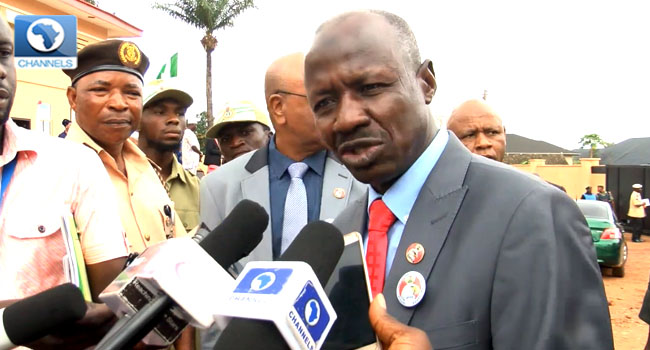
The Economic and Financial Crimes Commission (EFCC) has called on faith-based organisations to rise to the occasion in the fight against corruption in the country.
In a statement on Monday by the spokesman for the commission, EFCC Acting Chairman Mr Ibrahim Magu asked religious leaders to teach their faithful moral uprightness and integrity.
Magu spoke through the Head of EFCC Ibadan Zonal Office, Mr Mohammed Rabo, on Saturday last week at the 7th Triennial National Delegate Conference of the National Council of Muslim Youth Organisations.
According to him, “Every religion teaches the fear of God and abhors every behavioural digression that promotes moral decadence, impurity and all forms of vices including corruption”.
Quoting Prophet Muhammad in a famous Hadith, the EFCC boss added: “Whoever amongst you sees something wrong, he should change it physically – using his hand, if he is not able to do so with his hand, he should change it orally – speaking out in condemnation against it.
“If that is still not possible, he should detest it in his mind; this constitutes the weakest level of faith.”
He noted that given the teachings of the above Hadith and the corresponding dictates in other religion, there is no reason why all and sundry who believe in the commandments of God should not be in the forefront in the fight against corruption and other vices in the society.
Magu stressed further that the strength or weakness of one’s faith can be measured by the ability or otherwise to stand up to and challenge those committing evil acts, including those acts that negatively impact social, economic and moral well-being.
He decried how people whip up religious sentiments whenever they are called upon to account for any alleged misdeed.
The EFCC boss also lamented that corrupt people were sponsoring individuals to claim that they were being prosecuted because of their region or ethnic identity.
“They do their utmost not to answer the all-important question of whether or not they were guilty of the corruption allegations against them,” he said.
The acting chairman, however, noted that the EFCC is oblivious of people’s religion or ethnic identity when they are arrested and prosecuted for economic and financial crimes.
He then asked that “who among the corrupt and those engaged in financial and economic crimes does so in the name of his or her region, religion or ethnic group?”
Magu pointed out that those that have been interrogated and prosecuted by the anti-graft agency “cornered resources” meant for their people to private use, only to turn and appeal to those same people and trigger ethno-religious sentiments.
He further urged the youth to form a vanguard against corruption and make themselves ambassadors of integrity by questioning any momentary wealth and ostentatious living.



